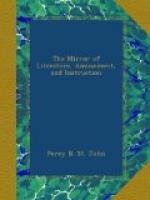of the first reputation in various studies. She
was a great collector of books, manuscripts, medals,
paintings, &c. In 1654, when she was only in
her 28th year, Christina abdicated the crown, in order
that she might live a life of freedom. With her
crown, she renounced the Lutheran and embraced the
Catholic religion. In quitting the scene of her
regal power, she proceeded to Rome, where she intended
to fix her abode. Some disgust which she received
at Rome, induced her, in the space of two years, to
determine to visit France. Here she was treated
with respect by Louis XIV., but the ladies were shocked
with her masculine appearance and demeanour, and the
unguarded freedom of her conversation. Apartments
were assigned her at Fontainbleau, where she committed
an action, which has indelibly stained her memory,
and for which, in other countries, (says her biographer,)
she would have paid the forfeit of her own life.
This was the murder of an Italian, Monaldeschi, her
master of the horse, who had betrayed some secret
intrusted to him. He was summoned into a gallery
in the palace; letters were then shown to him, at the
sight of which he turned pale, and entreated for mercy;
but he was instantly stabbed by two of her own domestics
in an apartment adjoining that in which she herself
was. The French court was justly offended at this
atrocious deed; yet it met with vindicators, among
whom was Leibnitz, whose name was disgraced by the
cause which he attempted to justify. Christina
was sensible that she was now regarded with horror
in France, and would gladly have visited England,
but she received no encouragement for that purpose
from Cromwell. She returned to Rome, and resumed
her amusements in the arts and sciences. In 1660,
on the death of Charles Gustavus, she took a journey
to Sweden to recover her crown; but her ancient subjects
rejected her claims, and submitted to a second renunciation
of the throne; after which she returned to Rome.
Some differences with the pope made her resolve, in
1662, once more to return to Sweden; but the conditions
annexed by the senate to her residence there were
now so mortifying, that she proceeded no farther than
Hamburgh. She went back to Rome, and cultivated
a correspondence with the learned men there, and in
other parts of Europe, and died in 1689, leaving behind
her many letters, a “Collection of Miscellaneous
Thoughts or Maxims,” and “Reflections on
the Life and Actions of Alexander the Great.”
P.T.W.
* * * * *
METHOD OF ASCERTAINING THE STATE OF THE LUNGS.
(For The Mirror.)
Persons desirous of ascertaining the true state of their lungs, are directed to draw in as much breath as they conveniently can; they are then to count as far as they are able, in a slow and audible voice, without drawing in more breath. The number of seconds they can continue counting must be carefully observed; in a consumption, the time does not exceed ten, and is frequently less than six seconds; in pleurisy and pneumonia, it ranges from nine to four seconds. When the lungs are in a sound condition, the time will range as high as from twenty to thirty-five seconds.




